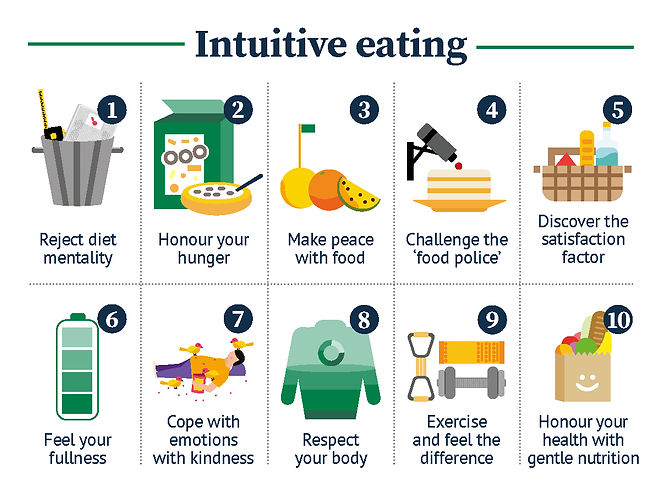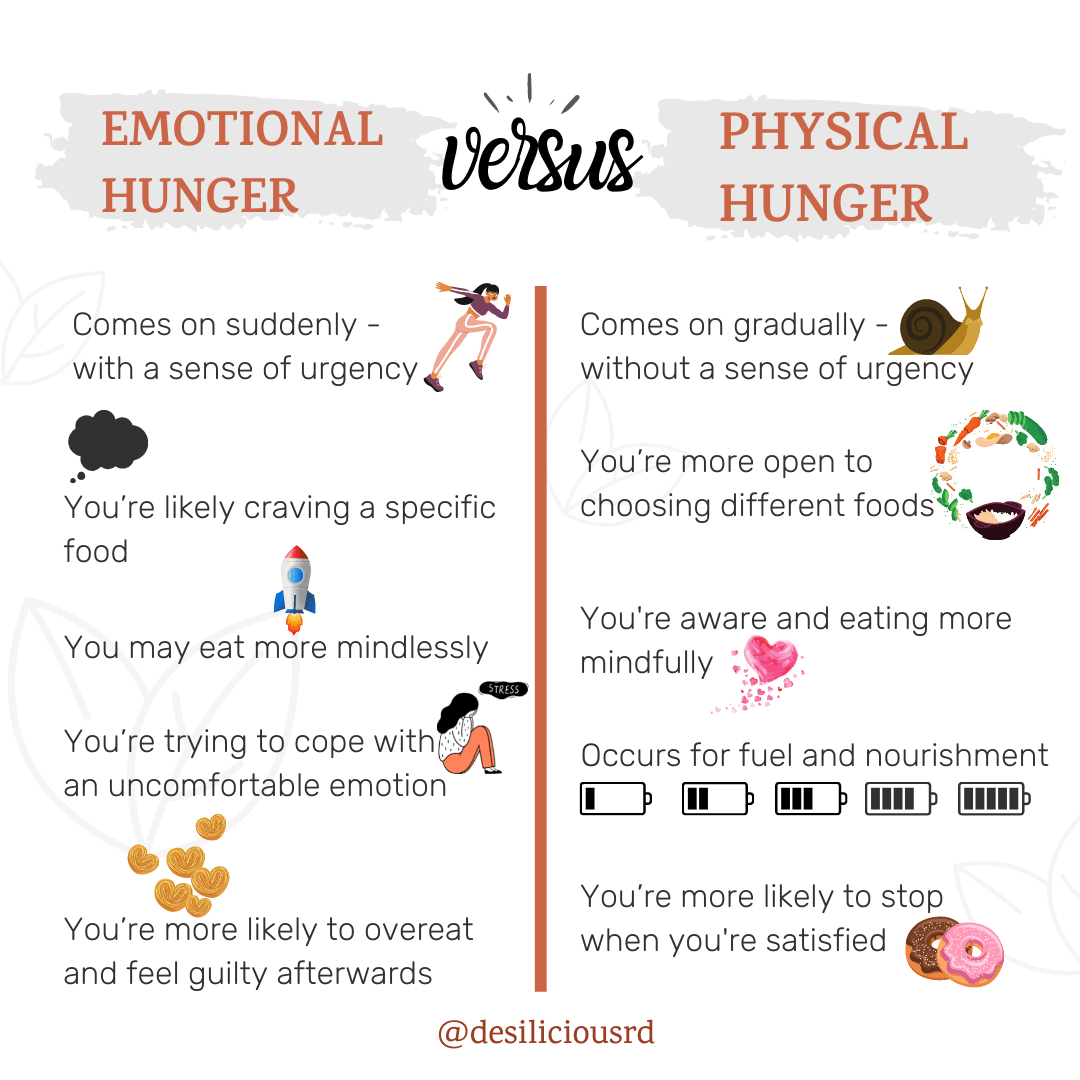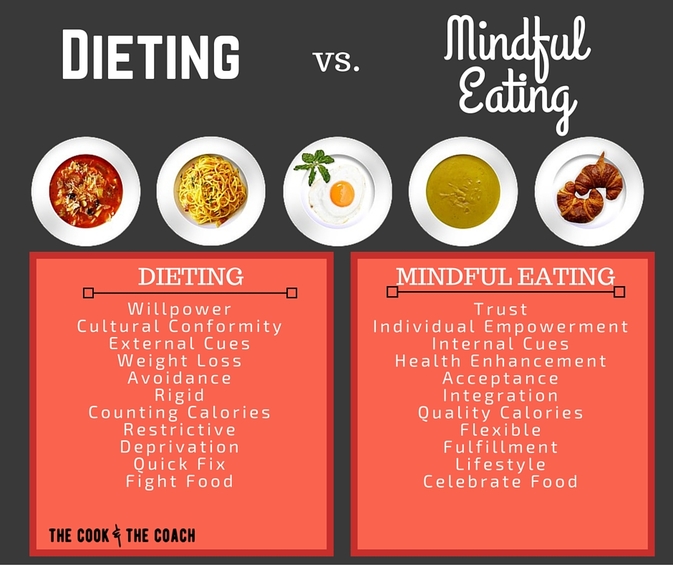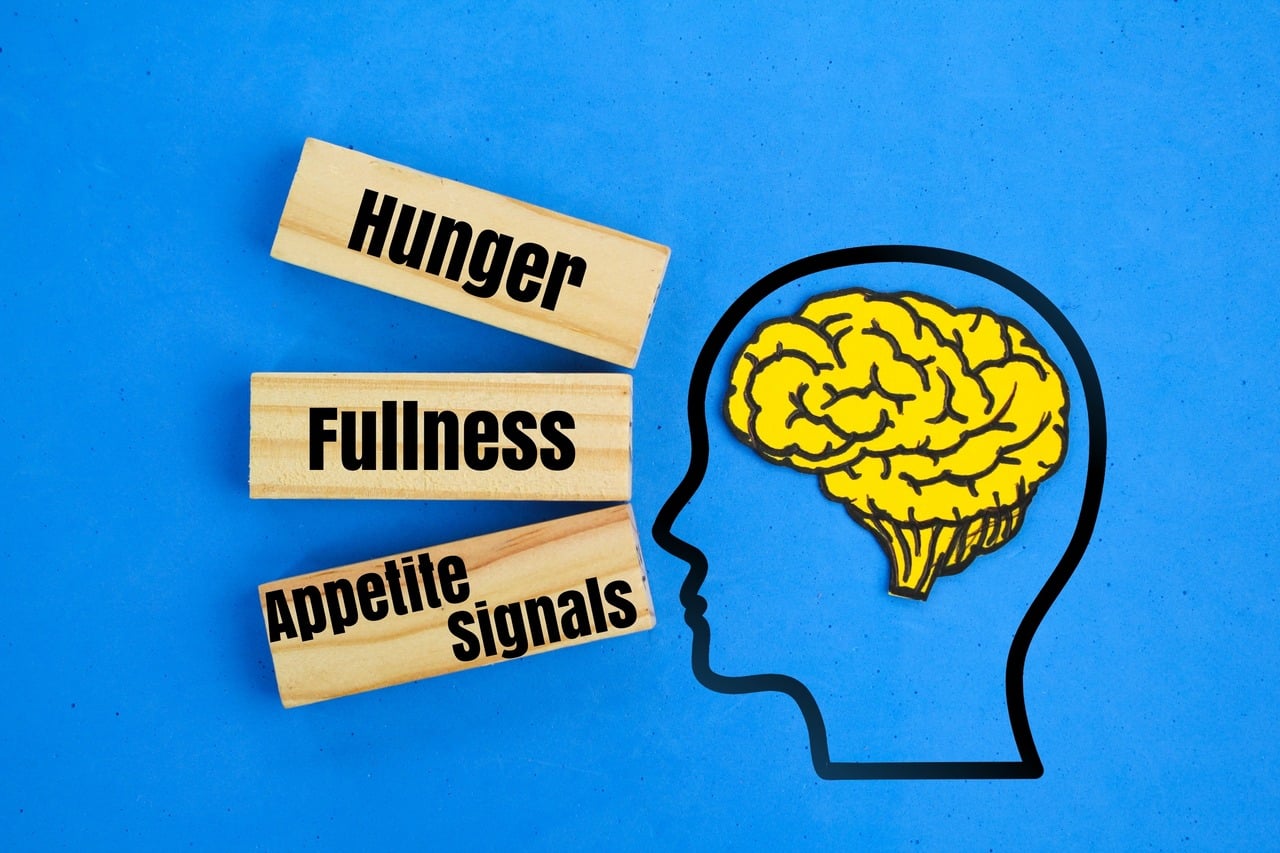Introduction to Intuitive Eating
What is Intuitive Eating?

[Source: smhrenew.com]
Tired of counting calories and following strict food rules? Intuitive eating offers a refreshing alternative to traditional dieting approaches. Unlike many outdated health rules that focus on restriction, intuitive eating embraces a more natural relationship with food. [#1]
At its core, intuitive eating is a non-diet approach that helps you rebuild trust with your body and food choices. Rather than following external guidelines about what, when, and how much to eat, this method encourages you to tune into your body’s internal signals. [#2]
Principles of Intuitive Eating
This approach stands out because it welcomes all foods into your eating pattern without labeling them as good or bad. Gone are the days of feeling guilty about eating certain foods or following rigid meal plans. Instead, intuitive eating promotes a peaceful relationship with food through several key principles. [#3]
- Rejecting the diet mentality
- Honoring your hunger
- Making peace with food
- Challenging the food police
- Discovering satisfaction in eating
- Feeling your fullness
- Coping with emotions without using food
- Respecting your body
- Moving your body – feeling the difference
- Honoring your health with gentle nutrition
How Intuitive Eating Works
Signs of Physical and Emotional Hunger

[Source: shahzadidevje.com]
Understanding how your body communicates hunger is fundamental to intuitive eating. Physical hunger develops gradually and can be felt in your stomach, while emotional hunger often comes on suddenly and feels more like a craving. Learning to differentiate between these signals helps you respond appropriately to your body’s needs.
Physical hunger signs include:
- Growling stomach
- Low energy levels
- Difficulty concentrating
- Gradual build-up of hunger
- Satisfaction after eating
Intuitive Eating vs. Mindful Eating
While often confused, intuitive eating and mindful eating are distinct approaches. Mindful eating focuses primarily on being present during meals, while intuitive eating encompasses a broader philosophy about your relationship with food. [#4]
The practice involves making peace with all foods and removing labels like good or bad. Instead of following strict meal plans that might trigger hormonal imbalances, intuitive eating encourages you to trust your body’s wisdom. This approach can be particularly helpful for those who have struggled with weight fluctuations caused by hormonal changes.
By focusing on body cues rather than external rules, intuitive eating helps establish a natural eating pattern. This method acknowledges that sometimes you might eat more than usual, while other times you might eat less – and both scenarios are perfectly acceptable.
Benefits of Intuitive Eating
Why Intuitive Eating is Beneficial
[Image credit: wholistic_health_and_wellness @ instagram.com]
The advantages of intuitive eating extend far beyond physical health. Research demonstrates that this approach positively impacts both mental and emotional well-being. Studies show that people who practice intuitive eating often experience improved body satisfaction and decreased rates of depression. [#5]
Mental health benefits include:
- Reduced anxiety and depression symptoms
- Better body image and self-acceptance
- Lower stress levels around food choices
- Improved self-trust and confidence
Physical health advantages have also been documented through research. People who adopt intuitive eating practices typically maintain a more stable body mass index (BMI) and experience fewer weight fluctuations. [#6] This stability can lead to sustained energy levels throughout the day and better overall health outcomes.
Intuitive Eating vs. Traditional Dieting

[Source: thecookandthecoach.com]
Unlike conventional diets that often result in a cycle of restriction and overeating, intuitive eating promotes a balanced relationship with food. Traditional diets frequently lead to feelings of deprivation, which can trigger binge eating and emotional distress. In contrast, intuitive eating eliminates food guilt and promotes long-term sustainability.
The sustainable nature of intuitive eating stems from its focus on internal wisdom rather than external rules. By listening to your body signals and honoring your hunger and fullness cues, you naturally develop eating patterns that support your physical and emotional needs. This approach helps maintain consistent energy levels and promotes a more balanced lifestyle.
Common Myths and Misconceptions
Addressing Myths About Intuitive Eating
Despite growing recognition of its benefits, several misconceptions about intuitive eating persist. One prevalent myth suggests that intuitive eating is just another weight loss diet. However, this approach fundamentally differs from traditional dieting methods.
Let’s debunk some common misconceptions:
- Myth: Intuitive eating means eating whatever you want, whenever you wantReality: While intuitive eating promotes food freedom, it emphasizes listening to your body’s hunger and fullness signals, not mindless eating.
- Myth: You’ll gain weight with intuitive eatingReality: Research shows that intuitive eating often leads to a stable, natural weight as you learn to honor your body’s needs rather than following restrictive habits that can lead to weight gain.
- Myth: Intuitive eating ignores nutritionReality: This approach actually helps you develop a balanced relationship with all foods while maintaining awareness of nutritional needs.
- Myth: It’s impossible to practice intuitive eating with health conditionsReality: Many people successfully combine intuitive eating with medical nutrition requirements, similar to how some manage their slow metabolism while honoring hunger cues.
A significant advantage of intuitive eating is its protection against harmful diet culture messages that often promote restrictive eating patterns. Unlike rigid diets that tell you which foods to avoid for quick results, intuitive eating teaches sustainable, long-term habits.
Understanding these misconceptions helps clear the path toward a healthier relationship with food. Rather than viewing intuitive eating as a quick fix, consider it a journey of reconnecting with your body’s natural wisdom about hunger, satisfaction, and nourishment.
Potential Challenges and Considerations
Pros and Cons of Intuitive Eating

[Source:healthyifyme]
While intuitive eating offers numerous benefits, it’s essential to acknowledge that this approach comes with its own set of challenges. Understanding these potential hurdles can help you prepare for a more successful journey.
The advantages of intuitive eating include:
- Freedom from restrictive eating patterns
- Better understanding of your body’s signals
- Reduced stress around food choices
- Long-term sustainability
However, some challenges might arise:
- Initial difficulty in distinguishing physical hunger from emotional hunger
- Possible weight fluctuations as your body adjusts
- Learning to balance nutrition needs with food preferences
- Managing social pressure and external food rules
Potential Pitfalls and Unanswered Questions
One significant consideration is that intuitive eating requires a flexible structure and self-control to regulate eating habits effectively. [#7] This balance can be particularly challenging for those transitioning from strict dieting backgrounds.
Some individuals might experience temporary weight gain, particularly if they’re recovering from restrictive eating patterns. This is a normal part of the process for many people. [#8] The focus should remain on developing a healthy relationship with food rather than weight outcomes.
Medical considerations also play a crucial role. People with specific health conditions such as diabetes or high blood pressure should consult healthcare providers before adopting intuitive eating. These conditions might require additional monitoring or modifications to the standard intuitive eating approach.
A practical challenge many face is navigating food choices in a world filled with processed foods and artificial ingredients. Learning to balance natural food preferences while maintaining awareness of nutritional needs takes time and practice.
Practical Tips for Practicing Intuitive Eating
How to Eat Intuitively

[Source: npr.org]
Starting your intuitive eating journey requires patience and self-compassion. The process begins with understanding and implementing core principles that help rebuild your relationship with food. One fundamental principle is to honor your hunger – this means eating when your body signals it needs nourishment, rather than following strict meal times. [#9]
Physical activity plays a vital role in intuitive eating, but not in the way most diet programs suggest. Instead of exercising for weight loss, focus on movement that brings joy and energy to your daily life. This might include dancing, hiking, swimming, or any activity that makes you feel good.
Tips for Beginners
- Start with regular meal timing to establish baseline hunger signals
- Remove distractions while eating – turn off screens and focus on your food
- Practice rating your hunger on a scale from 1-10 before and after meals
- Keep a food and mood journal to identify emotional eating patterns
- Stock your kitchen with foods you genuinely enjoy and that make you feel good
Professional guidance can make a significant difference in your intuitive eating journey. Working with a registered dietitian or nutritionist helps create a personalized approach that considers your specific needs and circumstances.
Remember that transitioning to intuitive eating takes time. Start with small changes, like pausing before meals to check in with your hunger levels, or taking an extra few minutes to savor your food. These simple adjustments can lead to lasting improvements in your relationship with food.
Conclusion
The Bottom Line on Intuitive Eating
Intuitive eating represents a revolutionary shift from traditional diet culture to a more sustainable and healthy relationship with food. Unlike professional ballerinas who follow strict eating regimens, intuitive eating encourages you to trust your body’s natural wisdom about food choices and portions.
The success of intuitive eating lies in its long-term sustainability. While many celebrities bounce between extreme diets for quick results, intuitive eating offers a gentler, more effective approach to health and wellness. This method helps you break free from the cycle of restrictive eating and guilt, leading to improved physical and mental well-being.
- Freedom from restrictive eating rules and diet culture
- Better understanding of your body’s hunger and fullness signals
- Improved mental health and reduced food-related anxiety
- Sustainable approach to nutrition without counting calories
- Enhanced enjoyment of food and eating experiences
Starting your intuitive eating journey might feel challenging at first, but the benefits far outweigh the initial adjustment period. By rejecting diet culture and embracing your body’s natural signals, you can develop a healthier relationship with food that lasts a lifetime.
Remember that progress isn’t linear, and becoming an intuitive eater takes practice and patience. The goal isn’t perfection but rather building a peaceful and satisfying relationship with food that supports your overall well-being.